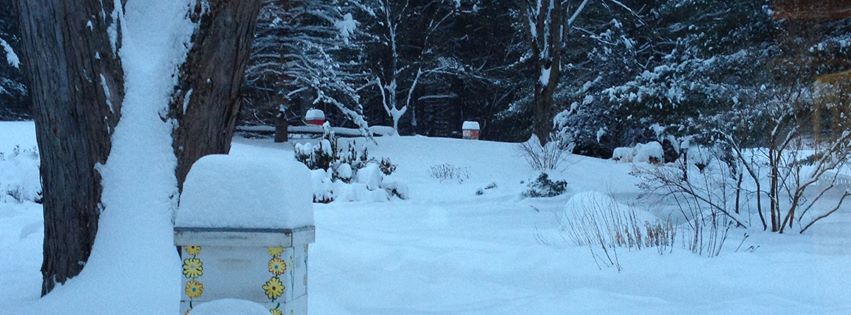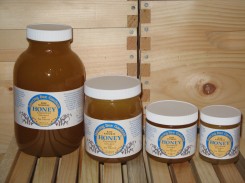Honey bees are an essential fact of the innkeeping life here at Golden Stage Bed and Breakfast.
Our hive tours entertain and educate guests; the harvest season brings folks from far and near to our annual Honey Harvest Festival; and, of course, the golden reward of raw honey from the inn’s backyard sweetens guests’ morning tea and breakfast treats year-round.
Julie and I attended a natural beekeeping conference this weekend with renowned organic beekeeper Ross Conrad of Dancing Bee Gardens in Middlebury, Vermont. Ross Conrad wrote the first book in the United States about organic beekeeping practices, so naturally we had to check this out! The beekeeping workshop was part of Grafton Nature Museum’s 2014 Adult and Family Programs. The theme this year is ‘The Birds and the Bees.’ Conrad also did a presentation for this series that Julie attended a few weeks ago about Colony Collapse Disorder. Coming up this week is a talk with Sara Zahendra about Native Bumblebees, and on April 9th, Bridget Butler ‘The Bird Diva’ will present a workshop on bird-watching!
So, back to the organic beekeeping workshop…
Though I have not yet started my own backyard beekeeping, I figured I could still pick up some advice or inspiration from the talk. Sure enough, I walked away with my head positively buzzing with knowledge and excitement about keeping bees. Here, I’d like to share with you some of the lessons I learned from Ross Conrad!
- Treat your bees well. Some people buy hives with the expectation of having a low-maintenance pet. Bees should be cared for just as you would any other livestock or living creature. Visit their hives once a week; be attune to their state of health; do what is natural and good for the bees rather than simply caring about the size of your honey harvest.
- To begin beekeeping, learn by doing! As a beginning beekeeper myself, I really took this message to heart. I can attend as many talks as I want, and read every book about bees, but that will not make me a good beekeeper! The best way to learn beekeeping is to do it. Just as in real life, we must learn from our failures. Conrad said, “When your hive fails, that colony was giving you a gift. They are helping you learn from your mistakes and be a better beekeeper in the future.” A beekeeper must take that opportunity to learn – to evaluate what went wrong and how she or he can do better next time. There are local beekeeping clubs to help you get started with networking all across the country.
- There is no correct way to keep bees. Every beekeeper has their own method. Some are organic, some use pesticides. Some are hobby beekeepers, some are commercial. Everyone has their own philosophy and rules when it comes to honey bees, and you will figure out your own once you spend time with your hives.
- Always control for mites. Ross Conrad’s three priorities with raising bees are health, honey and dryness. Keeping your bees healthy comes first! If you do nothing for varroa mites, which every hive will inevitably deal with, your bees will have weakened immune systems. This means their chances of succumbing to diseases, pests or difficult weather conditions will be threatened. Conrad listed many ways of controlling for varroa mites organically, so that your bees and honey are not exposed to pesticides or toxins.
- If you hold a bee in your hand, the world will be beautiful… because beauty is in the eye of the bee-holder!
Visit Vermont to meet the honey bees at Golden Stage Inn bed and breakfast and sample some local honey! Stay tuned to hear about our bee installation this spring.




